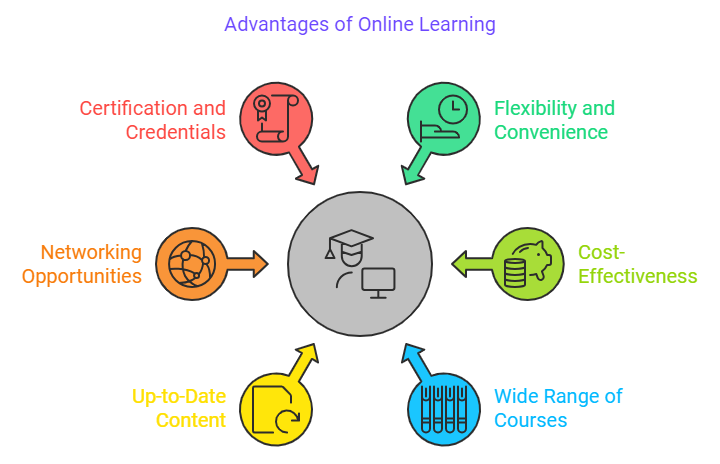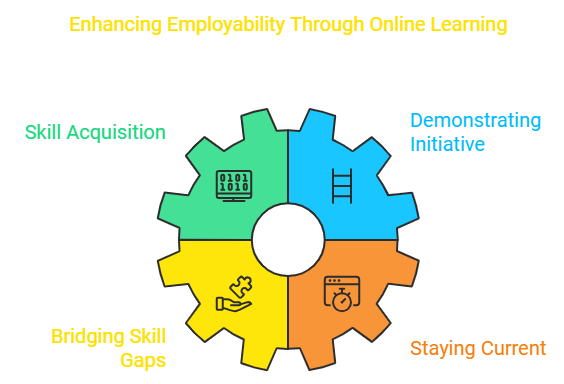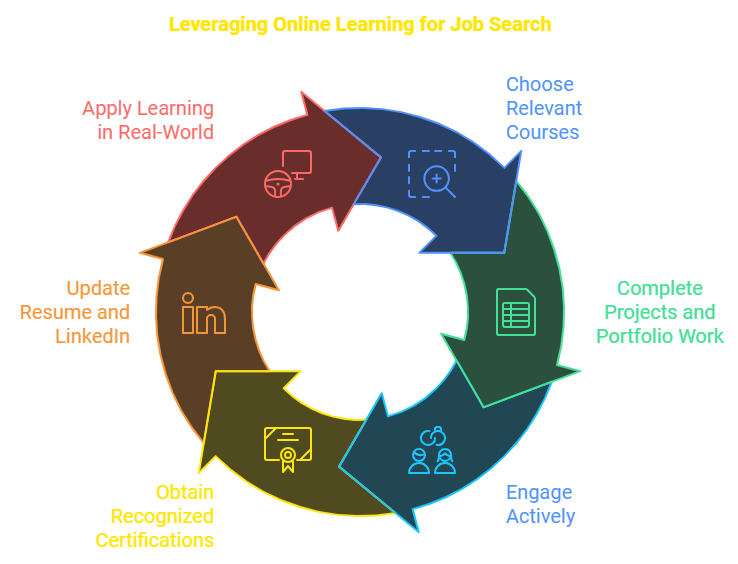In today’s fast-paced and ever-evolving job market, the demand for new skills and knowledge is constantly increasing. Online learning has emerged as a powerful tool that can help individuals acquire new competencies and improve their employability. This article will explore how online learning can significantly enhance your job prospects, the advantages it offers, and practical tips on leveraging this educational approach.
The Rise of Online Learning
Online learning, also known as e-learning or distance education, has grown exponentially in recent years. With advances in technology and a wider acceptance of digital platforms, individuals now have access to a rich array of courses, resources, and certification programs from the comfort of their own homes. Whether you are a recent graduate, a professional looking to upskill, or someone considering a career change, online learning can play a crucial role in your job search.
Advantages of Online Learning
- Flexibility and Convenience: Online learning allows you to study at your own pace and on your own schedule. This flexibility makes it easier to juggle work, family commitments, and education, enabling you to learn when it is most convenient for you.
- Cost-Effectiveness: Many online courses are more affordable than traditional in-person classes. Additionally, you can save on commuting and accommodation expenses. Scholarships and financial aid options are often available for those who qualify.
- Wide Range of Courses: Online platforms offer a diverse range of subjects and specializations, from technical skills like coding and data analysis to soft skills such as communication and leadership. This variety enables learners to pursue fields relevant to their career goals.
- Up-to-Date Content: The online learning landscape is constantly evolving, with many courses being updated regularly to reflect the latest industry trends and technological advancements. This ensures that you gain relevant and applicable skills that employers are looking for.
- Networking Opportunities: Many online learning platforms include forums, social media groups, and networking events, allowing you to connect with instructors and peers. These connections can lead to potential job opportunities and collaborations.
- Certification and Credentials: Completing an online course often results in a certificate or credential that can be added to your resume or LinkedIn profile. These certifications can demonstrate your commitment to professional development and your expertise in a particular area.

How Online Learning Can Enhance Employability
- Skill Acquisition: The job market often favors candidates who possess specific technical skills. Online courses provide an opportunity to learn and master these skills, making you a competitive candidate.
- Demonstrating Initiative: Engaging in online learning shows employers that you are proactive about your career and willing to invest time and effort into your professional development.
- Bridging Skill Gaps: If you are transitioning into a new field or aiming for a promotion, online learning can help bridge the gap between your current skills and those required for your desired position.
- Staying Current: Industries are changing rapidly due to technology and globalization. Online courses can help you stay up-to-date with industry standards, tools, and best practices.

Tips for Leveraging Online Learning in Your Job Search
- Choose Relevant Courses: Identify the skills that are in demand in your desired industry or occupation. Research job descriptions to understand what qualifications employers are looking for and select courses that align with those needs.
- Complete Projects and Portfolio Work: Many online courses include practical projects that can showcase your new skills. Create a portfolio that highlights these projects to demonstrate your abilities to potential employers.
- Engage Actively: Participate in discussions, ask questions, and collaborate with peers and instructors. Active engagement increases your learning experience and helps you build valuable networks.
- Certifications Matter: When selecting courses, prioritize those that offer recognized certifications, particularly from reputable institutions or industry leaders.
- Update Your Resume and LinkedIn Profile: Once you complete online courses, be sure to update your resume and LinkedIn profile with your new skills and credentials to attract the attention of hiring managers.
- Combine Learning with Real-World Experience: Whenever possible, apply what you learn through internships, volunteering, or freelance work. Practical applications of your online learning will enhance your resume and provide talking points during interviews.

Conclusion
Online learning is more than just an educational trend; it is a vital resource in today's competitive job market. By leveraging its flexibility, cost-effectiveness, and vast array of learning opportunities, you can enhance your skill set, demonstrate your commitment to professional growth, and significantly improve your job prospects. Whether you are just starting your career or looking to advance in your current role, investing in online learning can pave the way to achieving your professional goals.
Embrace the power of online education and take proactive steps toward making your career aspirations a reality.